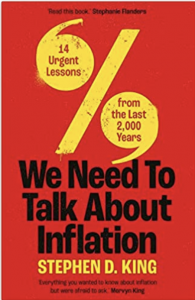[ad_1]
I used to be in my teenagers, rising up in a Lancashire mill city, the final time stubbornly excessive inflation was a factor. It was a scarring expertise. My dad and mom’ wages definitely didn’t sustain. Rocketing meals costs gave my mum sleepless nights, so she stocked up at any time when one thing like sugar or tea luggage was on particular supply. All of us turned obsessive about switching off lights and turning down heating. Our type of household was considerably affected – small financial savings within the financial institution, no labour market energy.
So Stephen King’s We Need To Talk About Inflation: 14 Urgent Lessons From the Last 2,000 Years spoke to me. It additionally proved prescient, having been written earlier than it was obvious how cussed the present bout of inflation is proving to be – one of many messages of the ebook is how onerous it’s to squeeze inflation out of the macroeconomy. The ebook takes the historic (and broadly chronological) perspective that will likely be acquainted to readers of Stephen’s earlier books, and is a pleasure to learn. Not surprisingly, the Nineteen Seventies chapter was significantly attention-grabbing to me. As he feedback on the finish of this chapter, “Inflation in the end undermines the material of society.” It’s profoundly unfair. But policymakers persist in attempting to inform individuals who can’t afford meals and warmth to indicate wage restraint – they did it then and have tried once more now.
There’s additionally a superb chapter on what works and what doesn’t when it comes to coverage responses, given how onerous the duty is. Worth and wage controls usually don’t, albeit with exceptions to deal with egregious unfairness, though they’re straightforward for policymakers to suggest. A transparent financial coverage framework with guidelines which are visibly adopted does work, and specifically financial financing of price range deficits should be dominated out. The takeaway message is that some nasty drugs is unavoidable, however it may work – if anyone will administer it. Whereas Milton Friedman insisted inflation was a financial phenomenon, this book concludes that it’s in the end a political one: who will bear how a lot financial ache and when?
[ad_2]


